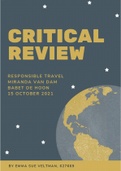,CRITICAL REVIEW
PREFACE
I am pleased to present the critical review essay of Emma Sue Veltman. It has been made with the
information and knowledge that has been gathered by the Sustainable Tourism and Critical Review
lectures of the track Responsible Travel.
The essay has been divided into several important categories:
1. Introduction
2. Explanation and justification
3. Critical comparison
4. Conclusion
The student would like to thank the lecturers of the track Responsible Travel for the information that
has been gathered regarding certain topics, frameworks, and criteria and the assessors Miranda van
Dam and Babet de Hoon.
5 October 2021
EMMA SUE VELTMAN, 627669 2
,CRITICAL REVIEW
TABLE OF CONTENTS
Preface .............................................................................................................................2
1. Introduction to the case studies..................................................................................4
1.1 Pro-Poor Tourism in a First World Urban Setting: Case Study of Glasgow Govan ............. 4
1.2 Collaboration for Community-Based Cultural Sustainability in Island Tourism
Development: A Case in Korea .................................................................................................. 4
2. Explanation and justification ......................................................................................5
2.1 Pro-Poor tourism........................................................................................................... 5
2.2 Empowerment .............................................................................................................. 6
2.3 Community-Based tourism ............................................................................................ 6
3. Critical comparison ....................................................................................................7
3.1 Community involvement ............................................................................................... 7
3.2 Improve quality of life ................................................................................................... 7
3.3 Cross-cultural learning ................................................................................................... 8
3.4 Distribution of benefits ................................................................................................. 8
3.5 Empowerment .............................................................................................................. 8
3.6 Pro-Poor tourism........................................................................................................... 9
4. Conclusion .................................................................................................................9
Bibliography ...................................................................................................................10
Attachments ...................................................................................................................11
Pro-Poor Tourism in a First World Urban Setting: Case Study of Glasgow Govan ...................... 11
Collaboration for Community-Based Cultural Sustainability in Island Tourism Development: A
Case in Korea ......................................................................................................................... 22
EMMA SUE VELTMAN, 627669 3
, CRITICAL REVIEW
1. INTRODUCTION TO THE CASE STUDIES
In this chapter, a short summary will be given of the chosen case studies as well as argumentation as
to why the case studies were chosen.
1.1 PRO-POOR TOURISM IN A FIRST WORLD URBAN SETTING: CASE STUDY OF
GLASGOW GOVAN
In the first case study, researchers discuss whether Pro-Poor tourism (PPT) principles could be used
to alleviate poverty in a developed and first-world destination. The research investigates Glasgow’s
borough Govan located in Scotland. The paper checks thoroughly into the different criteria of PPT and
how that is implemented in Govan (Butler, Curran, & O’Gorman, 2012).
In Govan, the community is being involved in tourism planning and there were plans of involving
volunteers in the redevelopment of the borough. Furthermore, a holistic livelihood approach is being
adopted in the planning process. For example, money that has been raised at a fund are going towards
providing a set of greenspaces such as a children’s playground. Creating volunteer friend groups at
historical sites or tourism developments helps with maintaining and running the sites. Another
implementation of PPT in Govan is advertising local jobs at the Glasgow Science Centre. The Fairfield
Shipyard offices are being transformed into a multi-use space where tourism and business can take
place. At last, government funded organizations offer help and guidance to tourism organizations in the
area and several tourism specialists are being brought in to help investigate Govan’s tourism offerings
(Butler, Curran, & O’Gorman, 2012).
After having done research into PPT in Govan, the researchers have made it clear that it has a positive
impact on the borough and on its residents as it provides more jobs for them. However, the term ‘poor’
might lead to embarrassment, harassment and anger under the residents and may burden the relieve
of poverty through tourism. Therefore, the researchers concluded to not label the PPT principles that
are being applied in Govan as Pro-Poor, despite the definition. Furthermore, a few of the principles that
are being applied might not only be perceived as Pro-Poor as there is a lack of awareness of the term
under the residents and because the principles could also be perceived as community-based tourism
(Butler, Curran, & O’Gorman, 2012).
In conclusion, PPT can be implemented in a developed and first-world destination. However, some
principles of PPT in Govan could be more perceived as community-based tourism. Next to that, as the
principles of PPT are being implemented in Govan, it cannot be labelled as Pro-Poor as it might cause
anger amongst the community.
To read the full article go to the attachments on page 11.
This case study was chosen by the student because it examines whether PPT principles could be
implemented into a well-developed and first-world destination. The results of the research offer a great
understanding of how PPT is implemented in such a destination, what the opinions are of the residents
regarding the topic and whether it gives the right outcome.
1.2 COLLABORATION FOR COMMUNITY-BASED CULTURAL SUSTAINABILITY IN
ISLAND TOURISM DEVELOPMENT: A CASE IN KOREA
In the second case study, researchers discuss whether it would be sufficient to implement Community-
Based tourism (CBT) on Jeju Island, South-Korea. The paper checks thoroughly into the island’s cultural
sustainability and whether CBT could help safeguard this. Various in-depth interviews were held with
the local community to examine how the community perceives the impact of tourism, whether they
associate cultural sustainability with community-based collaborations, and what the prospects of CBT
are (Li, Kim, & Lee, 2021).
EMMA SUE VELTMAN, 627669 4





